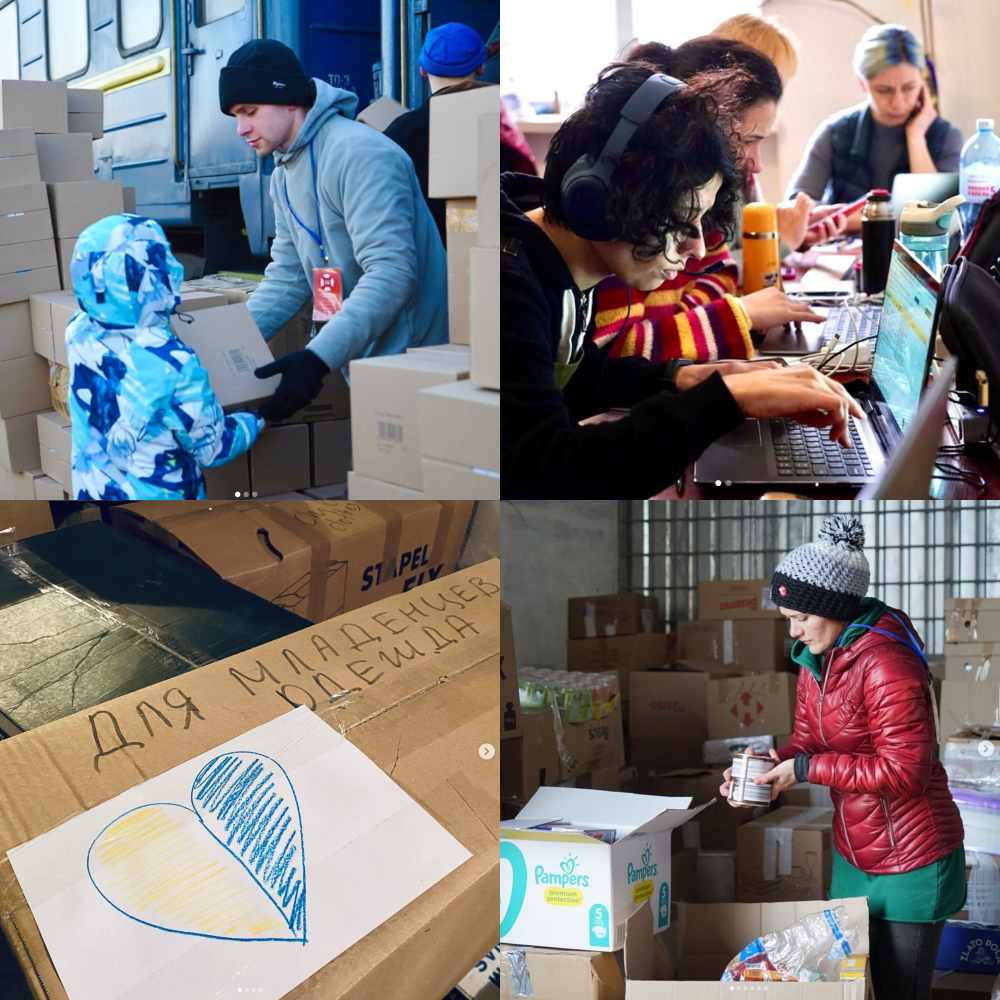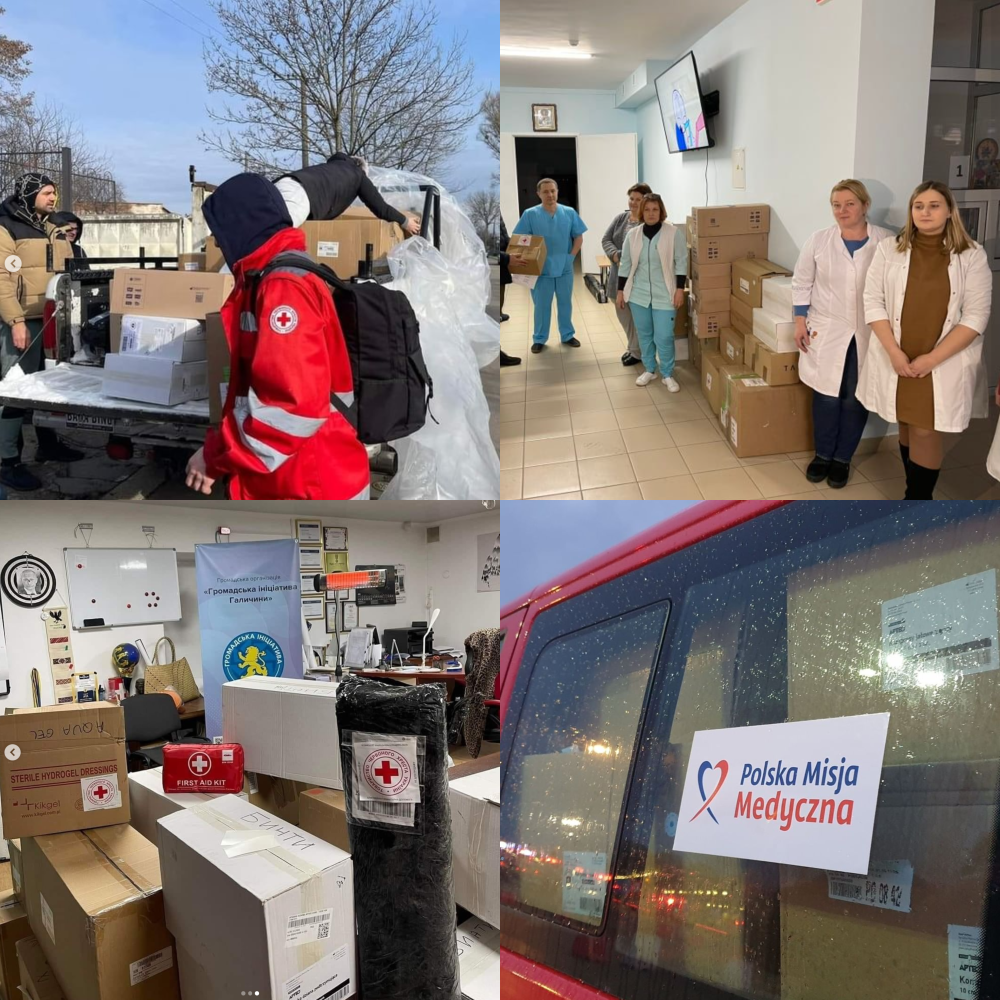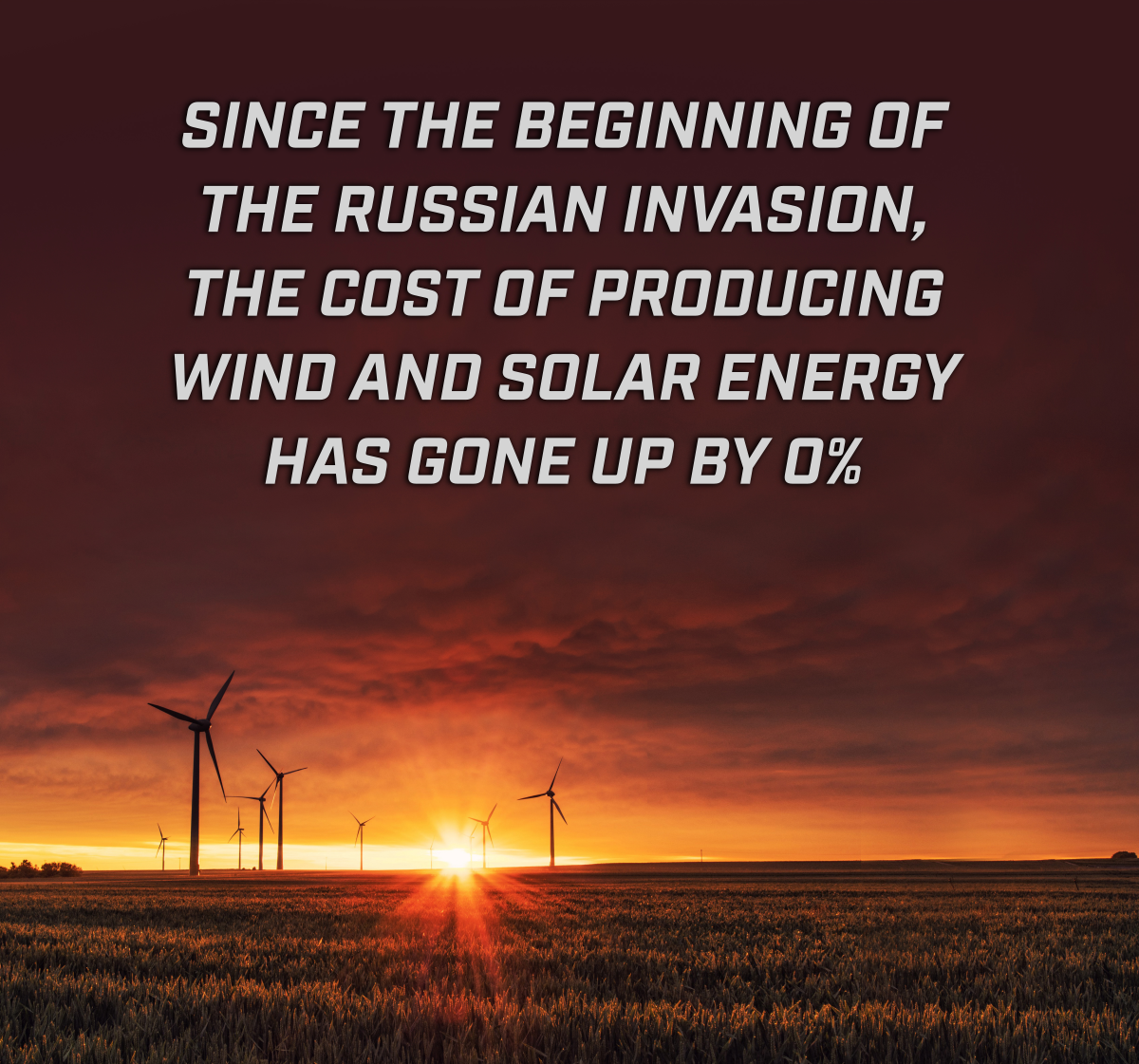A fortnightly roundup of good news from around the world. This is the free edition. For the full experience, you can upgrade to the weekly premium edition, which also comes with mind-blowing science and the best bits of the internet. One third of the subscriber fee goes to charity.
Become a paid subscriberGive a damn
The last two weeks have felt like November 1989 or September 2001; a sheer kick in the head by history, resurfacing as current affairs. We've all experienced this in our lives, moments when we know we're witnessing something profound unfolding, chapter markers in humanity's meandering path of progress and downfalls. The brutal war in Ukraine is such a marker; a new chapter in the book of human history.
It could be wishful thinking at such an early stage, but the horror of Russia's invasion may turn out to be the opposite of what so many commentators have suggested. Instead of dealing the final blow to a wobbly rules-based global order, it seems to have strengthened it. In the words of Neoma's Nathan Gardels, "by crossing the line in Ukraine, Putin may have reinforced it everywhere else."
On one side stands Putin, on the other, the things that unite the rest of us. Freedom, dignity, respect, human rights, rule of law, solidarity, self-organization, social responsibility, equality, freedom of speech, peaceful protest, transparency, accountability, religious freedom, multiculturalism and international law. The global reaction has shown these are still universal values, and still worth fighting for.
We were still trying to get our heads around it last week, which is why this issue is late. Our apologies. We've been following every newsflash, but the cycle moves so fast it's impossible to keep up. The whole thing still feels unbelievable, or at least, it does outside Ukraine. For the millions who've fled across the border and for the many millions more who remain, the bombs, the fighting and the suffering are all too real.
Thanks to our paying subscribers, we're in a position to make a small difference. After some careful research, we've settled on two charities. The first is the Polish Medical Mission, who is shipping urgent medical supplies deep into the war zone, and is opening a field hospital in Ukraine too. The second is Vostok SOS, who are supplying the most necessary things for refugees - clothes, canned food, medicines, hygiene products, baby food, mattresses and bed linen.
We're sending each organisation $3,000. All of the funds will be spent directly on purchasing and distributing supplies to Ukrainians. If you'd like to see what they're doing on the ground, check out the links to their social media below. It's a drop in the ocean, but it still helps. Thanks to all of our paid members for making this possible and for your continued support. Actions speak louder than all the words.
Except these five:
Russian warship, go fuck yourself.


Meanwhile, back at the ranch...
For the first time in over two years, Future Crunch is appearing in public. We're going to be speaking on Tuesday 16th March, from 7:00pm - 9:30pm, at the State Library of Victoria. The evening will be hosted by Rwandan-British composer and storyteller Stéphanie Kabanyana Kanyandekwe, and we'll be there to kick things off, talking about adaptation in a world turned upside down.
We'll be joined by the director of Fair Share Fare Dr Jen Rae, who works with communities to develop cultural responses to climate change and improve food access, and musician Ben Opie, who works to democratise live music performance and champion the inclusion of new, diverse voices and audiences in classical music.
If you're in Melbourne, we'd love to see you, it's going to be such a great night out. Tickets are only $35.
An in person event! We can't believe they're finally happening again.
Get tickets hereGood news you probably didn't hear about
Saudi Arabia has become the fourth country in the WHO’s Eastern Mediterranean Region to eliminate trachoma, the leading infectious cause of blindness. It remains endemic in five countries in the region, but progress has substantially reduced the number of people requiring antibiotic treatment, from 39 million in 2013 to 11 million in 2020. WHO
Japan’s ten year cancer survival rate has increased to 58.9%. This is a disease that was once said to be incurable, but the survival rate has steadily increased alongside medical advances. Prostate cancer in Japan now has the highest survival rate at 99.2%, followed by female breast cancer at 87.5%, colorectal cancer at 69.7% and stomach cancer at 67.3%. Nippon
If you're not from Africa you've probably never heard of bilharzia, the world's most common parasitic infection. It's a debilitating disease caused by a freshwater worm, leading to chronic ill health. New data shows that in 2010, 51 million of sub-Saharan Africa's 223 million school children were infected. By 2019, that number had dropped to 28 million out of 288 million. WHO

Rodrigo Duterte has signed into law a bill raising the age of sexual consent in the Phillipines from 12 to 16. A ‘Romeo and Juliet’ clause will protect young, genuine lovers and the law will close loopholes such as an exemption in cases where victims agreed to marry their abuser. SCMP
A landmark ruling for human rights in the Middle East, with a court in Kuwait overturning legislation used to prosecute transgender people. The 2007 law, allowed authorities to arrest people whose appearance did not match the gender on their ID card. It's a rare advance in a region where being gay or transgender, if not expressly against the law, is usually treated as such. Irish Times
Colombia has decriminalized abortion procedures up to 24 weeks of gestation. The progress is thanks to the feminist 'green wave' sweeping Latin America with pro-choice advocates sporting green bandanas. Abortion was recently decriminalized in Argentina and Mexico, and Ecuador has decriminalized the procedure in cases of rape. Al Jazeera
It’s an awakening of women’s rights. We’ve arrived at a moment in which we were tired of being left behind and just started reclaiming our rights. For many years we were just waiting.
Paula Avila-Guillen, Executive Director of the Women’s Equality Centre

After a long history of conflict (how's that for an understatement), several Arab countries are welcoming Jewish people back to their countries. In the UAE a government-led effort has resulted in kosher restaurants, a Jewish centre and a state-financed synagogue, and in 2020 the UAE, Bahrain, Sudan, and Morocco all agreed to normalise relations with Israel. Economist
US immigration authorities have released new policies making it easier for children who are victims of abuse to qualify for green cards, finalizing changes first proposed more than a decade ago. Since 2010, more than 130,000 applications have been approved. These new policies will lead to even more vulnerable children being granted residency status. Reuters
The UK has pardoned all gay and bisexual men convicted under a law that criminalised same-sex relations until the 1980s. Activists fought for years to remove convictions for the thousands of men who have struggled to find jobs due a criminal record, in a move aimed at righting the wrongs of the past. Global Citizen
Israel and India have taken their first formal steps towards outlawing conversion therapy, banning medical professionals from providing the therapy. Doctors now face severe disciplinary action including potential revocation of their license.
This is a victory in the general struggle for tolerance and equality, but in my eyes, it is more basic and more critical because this is also a struggle for life itself, this is truly saving lives.
Nitzan Horowitz , Minister of Health, Israel

The only home we've ever known *
Chile is creating a new national park, covering 75,000 hectares of the Andes, to protect 386 glaciers that are melting due to climate change. The park is "a fundamental step that our country is taking to combat the destruction of nature" and will also help preserve native flora and animals likes pumas and foxes. France24
The UN has delivered a 'watershed' moment for animal rights, with a historic resolution formally recognising the links between animal welfare and the environmental crisis. Activists have campaigned for this for decades - it ensures greater awareness that how animals are treated affects not just the animals themselves but human health and the health of the environment. Newswire
New Zealand’s national bird is bouncing back from the brink, with the population of the North Island brown kiwi population of 20,000 expected to grow by more than 10% over the next three generations. Conservationists and volunteers have worked for over 30 years to save the flightless bird which struggled to survive the introduction of predators such as stoats, rats, and ferrets. Stuff
Humpback whales will be removed from Australia's threatened-species list. An independent scientific panel deemed the mammals had made a major recovery, after facing near extinction in the 1980s. The whales will still have protection in Australian waters, where it is offence to kill, injure, take, trade, keep, move, or interfere with a humpback. ABC
Basking sharks are now a ‘protected wild animal’ in Ireland thanks to new regulations to prevent hunting or interference with its breeding or resting places. The sharks are the second biggest fish in the world and feed on plankton. Irish waters are home to 15% -20% of the world’s basking shark population. Journal
175 nations came together last week to strike “the most significant environmental multilateral deal since the Paris accord”. Representatives endorsed an end to plastic pollution, with a legally binding pact to address the full life cycle of plastics and a financing model to support lower-income countries. Work now begins on implementing the treaty by 2024. NYT
“Against the backdrop of geopolitical turmoil, the UN Environment Assembly shows multilateral cooperation at its best. Plastic pollution has grown into an epidemic, but with today’s resolution we are officially on track for a cure.”
Espen Barth Eide, President, UNEA-5
Without much fuss and even less public attention, America is in the midst of a multibillion-dollar shift to cage-free eggs in response to new laws and demands from restaurants. Cage-free housing has soared from 4% in 2010 to 28% in 2020, and is expected to reach 70% by 2025. The change marks one of the animal welfare movement’s biggest successes after years of battles with the food industry. AP
The Tequila fish has successfully been reintroduced the into the wild in Mexico, 18 years after it was declared extinct. In 1998, five pairs of fish were sent from a UK zoo to Michoacana University, where the population was protected and expanded. 1,500 fish were recently released into the river in Jalisco and the local community are playing a key role in monitoring the progress. BBC
Honduras has banned open-pit mining with immediate intervention for existing projects in areas of 'high ecological value'. It’s an unexpected win from a country that has a poor track record of threatening environmental defenders who oppose mining. Honduras joins El Salvador and Costa Rica as countries that have banned open-pit mining in Central America. Mongabay
The Svalbard Global Seed Vault in the Arctic just received seed donations from Sudan, Uganda, New Zealand, Germany, and Lebanon. The vault is located halfway between Norway and the North Pole, and holds over 1.1 million seeds from nearly 6,000 plant species. It was created in 2008 to preserve the diversity of the world’s crops from war, disease, and environmental threats.

Saving the world is cheaper than ruining it
Last seen staggering around on the lawn of Jimmy Carter's White House, energy security is suddenly back. Russia's invasion of Ukraine has shown that fossil fuels, long promoted as reliable, secure sources of energy, are actually the opposite: constantly at the mercy of unpredictable disruptions. The idea of renewables representing 'freedom energy' is everywhere - and only getting stronger. Everyone seems to have finally realised that other countries can't stop the wind blowing and the sun shining in yours.
This national security paradigm has turned out to be a much better mobilising force than the climate catastrophe paradigm. The speed of change has been astonishing. Shell, Exxon and BP spent decades building inroads to Russia’s fossil-fuel wealth, but in less than 60 hours last week, all announced exits, with no clear path to recoup their billions of dollars of investments. The $11 billion Nord Stream 2 project, a carbon bomb that had paralysed the West for years, is bankrupt, and Russia's prospecting plans in the Arctic looks like they're dead in the water too.
The invasion has brought a wartime energy transition to Europe. The continent’s decades-long timelines for overhauling energy systems that support 440 million people is now being revved up under extraordinary duress. The European Commission has already released a plan to cut most of its reliance on Russian gas by the end of this year, which is insane, considering the continent got 40% of its gas from Russia last year. As the EU's Green Deal chief, Frans Timmermans said, “We are now protecting our vital interest."
Nowhere is this acceleration more apparent than in Germany, a country which imports 65% of its gas from Russia. Europe’s leading economy has pledged to get 100% of its energy from renewables by 2035, bringing forward the previous target by 15 years, and also earmarked $220 billion to fund industrial transformation between now and 2026. In the announcement, German finance minister Christian Lindner described clean energy as, you guessed it, "the energy of freedom”. Reuters

Nordea, the biggest bank in the Nordic region, has announced it will cease all lending to offshore oil and gas (it currently has a €1 billion portfolio of assets in the sector). The bank also says it expects to devote more of its financing to the energy transition, with a fourfold increase in lending between now and 2025. Nordea
British bank Natwest cut lending to oil and gas clients by 21% last year, and just announced it will ditch coal companies that don’t have credible decarbonisation plans. French insurer CNP Assurances will no longer finance new oil and gas, and Dutch pension fund PFZW will disinvest from any fossil fuel company that doesn't have a 'convincing and verifiable' strategy to meet the Paris agreement.
Across the Atlantic, there's also been a marked change in tone too. A ban on Russian gas and oil imports by the Biden administration received bipartisan support and a significant majority of Americans say they're willing to put up with higher prices at the pump. The timing couldn't be better - the US electricity sector just passed a massive milestone: the amount of gas used for power generation has likely peaked and begun a long-term decline. The days of gas growing and gaining market share are over, and the beginning of a long, structural decline is now underway. IEEFA
On the flipside, the clean energy gold rush is just getting going. California just increased its renewables target to 72% by 2032, and on the east coast, an auction for offshore wind leases just totalled an amazing $4.37 billion, more than nine times the previous US record for offshore wind. By contrast, a sale of oil drilling rights in the Gulf of Mexico late last year attracted only $191.7 million.
Or maybe a new oil rush? Texas now has 106 GW of solar in its proposed pipeline. The motivation is clear: the Lone Star state boasts the fastest growth in power demand in the US, cheap land and abundant sunshine. “No one is sitting around saying ‘Are new solar additions going to slow down or collapse?' The only question seems to be ‘How high is this going to go?'" Bloomberg
Good news from our backyard: the state of Victoria has announced plans for 2GW of offshore wind by 2032, and 9 GW by 2040, after legislation passed last year cleared the way for development. The 10 proposed projects are looking to capitalise on strong wind resources along thousands of kilometres of coastline. Reuters
Meanwhile in China, the head of the National Development and Reform Commision, the country's chief state planner, has announced a plan to build (checks notes) 450 GW of solar, wind and hydro in the Gobi and other desert regions. This is absolutely mindblowing. To put that in perspective: the entire world collectively added 290 GW of renewables in 2021. Reuters
China is also targeting 30 GW of battery storage by 2025, and 100 GW of battery storage and 120 GW of pumped hydro by 2030. That's according to the head of the State Grid Corporation of China. These figures completely blow all previous forecasts for the Asia-Pacific region out of the water, and the impact on the learning curves for storage technologies will be enormous. Energy Storage News
And finally... it's the year 2022 and there are giant floating solar flowers on reservoirs in South Korea.

OK that's more than enough words. Thanks for reading, and a special thanks to all our paid subscribers for making the donations to Ukraine possible.
We'll see you all in a fortnight.
Much love,
FC HQ






